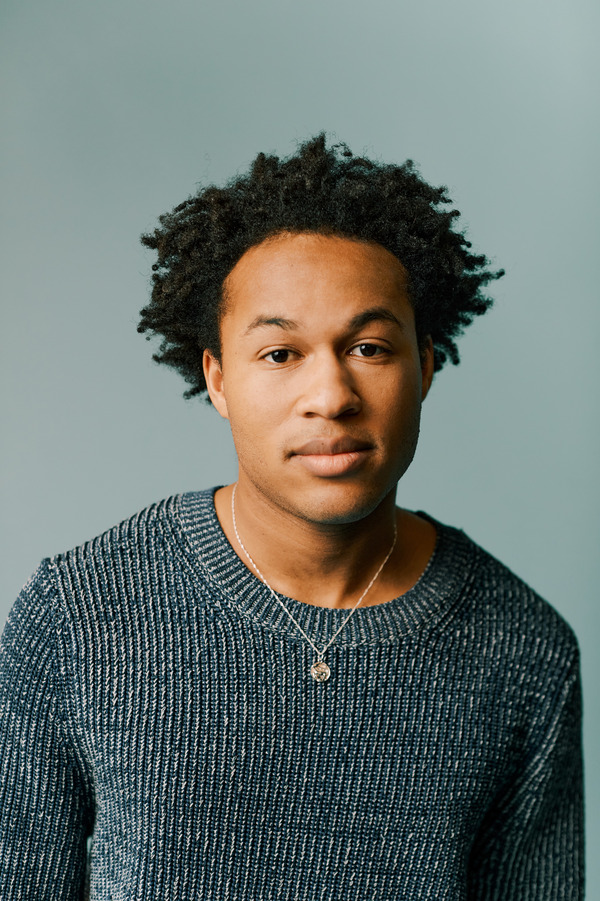Updated December 7, 2022 at 12:29 PM ET
Sheku Kanneh-Mason was six years old when he fell in love with the cello. "I remember seeing a whole orchestra performing and being just excited by the look of the cello, and asked to have lessons," the British cellist said. "I think my mom was relieved because ... I clearly wasn't somehow interested in the violin, but the cello immediately I was really into and had a great teacher from the start."
Playing this instrument, that closely imitates the human voice through its range and tone, is an "embrace," Kanneh-Mason explains, "sort of like dancing with the instrument ... It's just great to be so close to this amazing music and for it to come out of the instrument that's so close to you."
Kanneh-Mason spoke with Rachel Martin while visiting Washington, where he performed at NPR's headquarters for a Tiny Desk concert released in November. (He called the experience "nice and intimate.") Surrounded by LPs, books and memorabilia of all sorts at Bob Boilen's desk, Kanneh-Mason performed some of the solo preludes composer Edmund Finnis wrote for him, along with his own arrangements of Bob Marley's "No Woman, No Cry" and the Welsh folk song "Myfanwy."
The latter carries special meaning for Kanneh-Mason, whose grandmother i Welsh. "As children particularly, we'd spent most of our summers and other of the school holidays in Wales and walking in the hills," he recalled. "The music is such a big part of the culture as well, particularly singing and, that's how I got to know this music." The melody is about longing for love, "but I think for a lot of Welsh people, particularly ones who don't live in in Wales, it has this feeling of longing for home and longing for that place that is very, very special to us," he says.
Kanneh-Mason is the third-eldest of seven siblings, all classically trained musicians. In addition to the Welsh connection, they also share Antiguan heritage, through their father Stuart Mason, and ties to Sierra Leone through their mother Kadiatu Kanneh-Mason, who authored a memoir about raising her very musical family.
During pandemic-era lockdowns, the family practiced and performed livestreamed concerts together out of their parents' home in Nottingham. "It was full of people and music and food," he said. "We kept ourselves somehow or somewhat sort of entertained and sane a lot through music." They also played soccer outdoors and had a cooking competition — which he won. When his sister Isata's April 2020 concert at London's Royal Albert Hall was scrapped as theaters shut down, the siblings gathered together for a small ensemble performance of Beethoven's Third Piano Concerto.
Kanneh-Mason became a household name when he performed at Harry and Meghan's royal wedding in 2018 at Windsor Castle — he was just a teenager, and nearly two billion people tuned in. He also won the 2016 BBC Young Musician of the Year award, becoming the first black musician to score the prize since its launch in 1978. Now, the British cellist performs on stages around the world, sharing his love of classical, folk and pop.
He plays this eclectic mix on a cello that's more than 300 years old: Kanneh-Mason received a long-term loan of a cello built by Matteo Goffriller in Venice in 1700. It's an exceptional instrument the cellist describes as having a "kaleidoscope of tonal qualities." The Florian Leonhard Fellowship awarded the loan last year — a "dream come true" for Kanneh-Mason. Like many professional musicians, he cannot afford this antique piece of craftsmanship, and its lifetime use was purchased for a seven-figure sum by an anonymous syndicate of private investors, according to The Strad magazine. The late German cellist and conductor Johannes Goritzki previously played the instrument.

Growing up, Kanneh-Mason recalls the challenges of getting used to the routine of practice — in his case, half an hour or an hour before school and two or three hours after returning home.
"To be honest, it's what it takes... there's no shortcut," he said, noting his parents were "very helpful" in encouraging him. "I've grown to understand it's a really luxurious process to spend time on your own and just explore this music and focus and do all the problem solving and things like that. It can be quite a beautiful experience, but it's hard work as well, of course."
He also had some advice for aspiring young musicians: "Always, as often as possible, remind yourself of why you love why you love music and what's important about it, and [don't] lose sight of the importance of communicating music that can hopefully impact the audience that you are playing to. It can hopefully impact their life."
Kanneh-Mason performs on Dec. 8-10 at Philadelphia's Kimmel Center before touring in Germany, Austria and Portugal. His latest album is Song.
This interview was conducted by Rachel Martin and edited by Lilly Quiroz. To hear the broadcast version of this story, use the audio player at the top of this page.
Copyright 2022 NPR. To see more, visit https://www.npr.org.
Love the music?
Show your support by making a gift to YourClassical.
Each day, we’re here for you with thoughtful streams that set the tone for your day – not to mention the stories and programs that inspire you to new discovery and help you explore the music you love.
YourClassical is available for free, because we are listener-supported public media. Take a moment to make your gift today.

